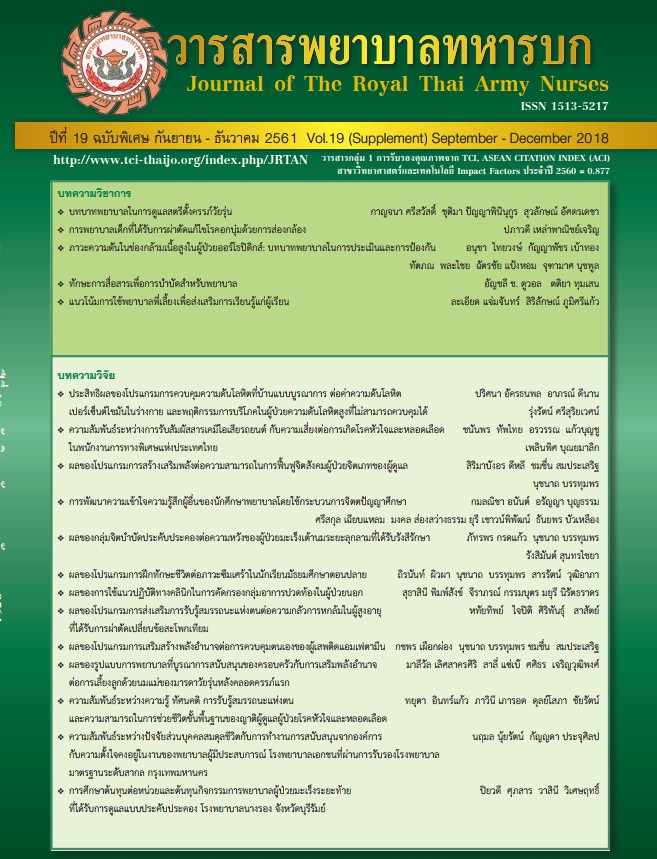Factors influencing antibiotics use behavior in sore throat, clean wound, and acute diarrhea among Village Health Volunteers
Keywords:
Antibiotic use behavior, Sore throat, clean wound, and acute diarrhea, Village Health VolunteerAbstract
This predictive correlation research aimed to study (1) antibiotic use behavior (2) factors predicting to predisposing, enabling, and reinforcing factors towards antibiotic use behaviors among village health volunteer (VHV) in Phompiram district, Phitsanulok province. The samples were 125 of VHVs. The samples were selected by proportional stratified random sampling. The questionnaire was used for data collection including 6 parts as follows: demographic data, knowledge about antibiotic, attitude towards antibiotic, enabling factors, reinforcing factors, and antibiotic use behavior. The reliability was acceptable with the range of .70 to .88. Data were analyzed by descriptive statistics and stepwise multiple regression with the significance level of p-value < .05. The results revealed that (1) the mean score for antibiotic use behavior was categorized as moderate level ( = 22.27; SD. = 5.25) and (2) the predicting factors were reinforcing factors, age, and attitude regarding antibiotic use which accounted for 45.6% of predicting antibiotic use behavior among VHVs. The recommendations were to inform public health personnel in facilitating the reinforcing factors regarding antibiotic use behavior by providing information, improving attitude towards antibiotic smart use, and emphasis on knowledge regarding antibiotic use on each age group to achieve the proper use of antibiotic in VHVs.
Downloads
References
2. Bureau of Information, Ministry of Public Health. Situation of antibiotic resistance in Thailand. 2013. (In Thai).
3. Céire C, Metcalfe Chris M, Lovering Andrew L, Mant David M, Alastair DH. Effect of antibiotic prescribing in primary care on antimicrobial resistance in individual patients: systematic review and meta-analysis. BMJ. 2010; 340: c2096. doi: 2010.1136/bmj.c2096.
4. Ministry of Public Health. Strategic planning for managing antibiotic resistance in Thailand B.E. 2560-2564. 2016; Nonthaburi: Ministry of Public Health. (In Thai).
5. Wongwian T. Knowledge on antibiotic use for acute upper respiratory tract infections among outpatients with that infections at Queen Savang Vadhana Memorial Hospital. Thai Journal of Pharmacy Practice. 2014; 6(2): 106-114. (In Thai).
6. Komwong D, Sangkhawat T. Factors Affecting Drug Use Behaviors of Village Health Volunteers. Thai Pharmaceutical and Health Science Journal. 2012; 7(3): 121-126. (In Thai).
7. Sumpradit N, Hunnangkul S, Phumart P, Prakongsai P. A survey of the antibiotic control and surveillance system and measures in promoting rational use of antibiotics: Preliminary results. Journal of Health Systems Research. 2012; 6(3): 361-373. (In Thai).
8. Sukpaiboon S, editor. Antibiotics use behavior of patients in Srangsoke, Ban Mo District. Saraburi Province. Proceedings on the 3rd national conference: Moving to the 2nd decade by integration knowledge to sustainability; 2016; Nakonratchasima college, Mueang district, Nakonrachasima Province: Nakonratchasima college. (InThai).
9. Awad AI, Aboud EA. Knowledge, Attitude and Practice towards Antibiotic Use among the Public in Kuwait. PLoS ONE. 2015; 10(2): e0117910. doi:0117910.0111371/journal.pone.0117910.
10. Green LW, Kreuter MW. Health Promotion Planning: An Educational and Ecological Approach. Mountain View, CA: Mayfield Publishing Company. 1999.
11. Saraluck M. Empowerment of Village Health Volunteers (VHV). Journal of Ubon Ratchathani university. 2010; 12(2): 39-48. (In Thai).
12. Phompiram District Health Office. Annual report 2016. Phitsanulok Provinces: Phompiram District Health Office. 2016. (In Thai).
13. Wayne WD, Chad LC. Biostatistics: A foundation for analysis in the health sciences 10th, editor. the United States of America: John Wiley and
Sons, Inc. 2013.
14. Best JW, Kahn JV. Research in education. (10th edition). United States of America: Pearson Education Limited. 2014
15. Singchangchai P. Principle and application of multivariate variables for nursing research. (3rd edition). Songkhla: Chan-Muang Publisher. 2006. (In Thai).
16. Andrajatia R, Tilaqzab A, Supardic S. Factors related to rational antibioticprescriptions in community healthcenters in Depok City, Indonesia. Journal of Infection and Public Health. 2017; 10: 41-48.
17. Porisutiwutiporn S, Hemchayat M. Infulencing factors of antibiotics use behavior of clients in Khlung hospital, Chanthaburi. Journal of Prapokklao Hospital Clinical Medical Education Center. 2014; 31: 114-127. (In Thai).
18. Roque F, Herdeiro MT, Soares S, Teixeira Rodrigues A, Breitenfeld L, Figueiras A. Educational interventions to improve prescription and dispensing of antibiotics: a systematic review. BMC Public Health. 2014; 14: 1276. doi: 1210. 1186/1471-2458-1214-1276.
19. Bediang G, Stoll B, Elia N, Abena JL, Nolna D, Chastonay P, et al. SMS reminders to improve the tuberculosis cure rate in developing countries (TB-SMS Cameroon): a protocol of a randomised control study. Trials. 2014; 15: 35.doi: 10.1186/1745-6215-1115-1135.
20. Tachavijitjaru C, Srisupornkornkul A, Changtej S. Selected Factors related with the Health Literacy of Village Health Volunteer. Journal of The Royal Thai Army Nurses. 2018; 19: S320-S332. (In Thai).
21. Cheng J, Coope C, Chai J, Oliver I, Kessel A, Wang D, et al. Knowledge and behaviors in relation to antibiotic use among rural residents in Anhui, China. Pharmacoepidemiology Drug Safe. 2018; 27: 652-659.
22. Demore B, Mangin L, Tebano G, Pulcini C, Thilly N. Public knowledge and behaviours concerning antibiotic use and resistance in France: a cross-sectional survey. Infection Control and Hospital Epidemiology. 2017; 45(4): 513-520.
23. Pereko DD, Lubbe MS, Essack SY. Public knowledge, attitudes and behaviour towards antibiotic usage in Windhoek, Namibia. Southern African Journal of Infectious Diseases, 2015; 30(4): 134-137. DOI: 10.1080/23120053.2015.1107290
24. Kaewphumhae W. Factors relating to the use of appropriate and safety drug behaviors of village health volunteer. Region 11 Medical Journal. 2017; 31(1): 61-71. (In Thai).
25. Ngo TN, Tran MK, Nguyen TT. Influencing Factors On Knowledge, Attitude And Behaviour Towards Antibiotic Usage Among Adults In Ho Chi Minh City, Viet Nam. Value in Health. 2016; 19(7): A479.
Downloads
Published
How to Cite
Issue
Section
License
บทความหรือข้อคิดเห็นใดใดที่ปรากฏในวารสารพยาบาลทหารบกเป็นวรรณกรรมของผู้เขียน ซึ่งบรรณาธิการหรือสมาคมพยาบาลทหารบก ไม่จำเป็นต้องเห็นด้วย
บทความที่ได้รับการตีพิมพ์เป็นลิขสิทธิ์ของวารสารพยาบาลทหารบก
The ideas and opinions expressed in the Journal of The Royal Thai Army Nurses are those of the authors and not necessarily those
of the editor or Royal Thai Army Nurses Association.






